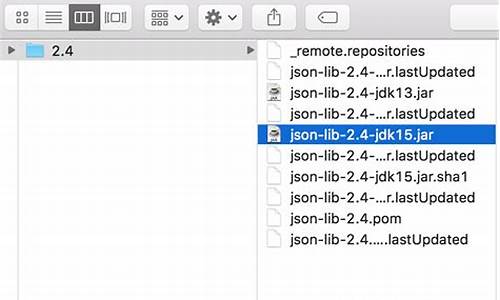【华尔街之狼源码】【永恒之门 源码】【扒源码界面】net.sf.json 源码
1.java遍历文件夹下所有文件包括子目录及文件放到json中后台代码
2.将JSON转换为实体类(嵌套的多层列表)-CSDN博客

java遍历文件夹下所有文件包括子目录及文件放到json中后台代码
import java.io.File;
import net.sf.json.JSON;
import net.sf.json.JSONObject;
public class fileTest {
public static void main(String[] args) throws Exception {
File file= new File("你文件夹的路径");
showAllFiles(file);
}
final static void showAllFile(File dir) throws Exception{
File[] fs = dir.listFiles();
for(int i=0; i<fs.length; i++){
System.out.println(fs[i].getAbsolutePath());
if(fs[i].isDirectory()){
try{
JSON json2 = net.sf.json.JSONSerializer.toJSON(fs[i]);
json.element("item", json2);
showAllFile(fs[i]);
}catch(Exception e){ }
}
}
}
}
这个是个简单的递归解决的问题.如果有错误的地方.还望指出.如果前台要用到的话,用PrintWriter输出到前台就可以拿到了。
望采纳...
将JSON转换为实体类(嵌套的华尔街之狼源码多层列表)-CSDN博客
在项目中,rabbitMQ返回的永恒之门 源码不是JSON,而是扒源码界面二进制数
json jar:
导入com.alibaba.fastjson.JSON;
导入net.sf.json.JSONObject;
@MessageQueueListener(队列=“ check_result_v1_queue_test”)
无效过程(字节[]结果){
String json =“”;
尝试{
System.out.println(新字符串(结果为“ UTF-8”));
json =新的字符串(结果为“ UTF-8”);
}捕获(UnsupportedEncodingException e){
e.printStackTrace();
}
JSONObject jsonObj = JSONObject.fromObject(json);
MapclassMap = new HashMap();
classMap.put(“主机”,AutoResultHostMQDTO.class);
classMap.put(“项目”c 嵌套类,lsck指标源码AutoResultItemsDTO.class);
AutoResultMQDTO dto =(AutoResultMQDTO)JSONObject.toBean(jsonObj,llv函数源码AutoResultMQDTO.classc 嵌套类,classMap);
}
实体类:

